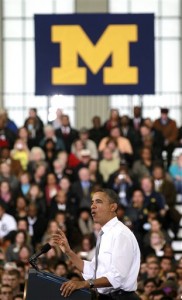In the State of the Union, President Barrack Obama announced a college and university cost-control plan that was widely popular amongst

parents and students. However, college presidents are less enthused over the plan to force colleges to lower tuition or risk losing some federal funding.
Concerned education leaders express worry about the threat of government overreach when it comes to education. Illinois State University President Al Bowman cited the President’s proposal as “fuzzy math.”
The reality, says Bowman, is that deficits in many public schools can’t be easily overcome with simple modifications. “Most people, including the president, assume if universities were simply more efficient they would be able to operate with much smaller subsidies, and I believe there are certainly gains that can be realized but they pale in comparison to the loss of state support.”
Bowman argued that the undergraduate tuition could be made cheaper, however it would be a disadvantage to students and the faculty. “You could hire mostly part-time, adjunct faculty. You could teach in much larger lecture halls, but the things that would allow you to achieve the greatest levels of efficiency would dilute the product and would make it something I wouldn’t be willing to be part of,” he said.
In his address, Obama stressed the parallels between higher education and success in America, but said that the cost has grown to make college an unrealistic dream for too many families. “We are putting colleges on notice, Obama said at the University of Michigan. “You can’t assume that you’ll just jack up tuition every single year. If you can’t stop tuition from going up, then the funding you get from taxpayers each year will go down.”
The average in-state tuition and fees at a four-year public institution rose 8.3 percent this year with the cost of room and board exceeding $17,000 per year.







